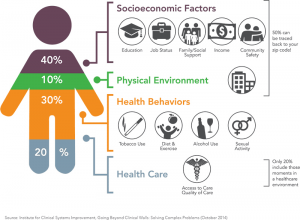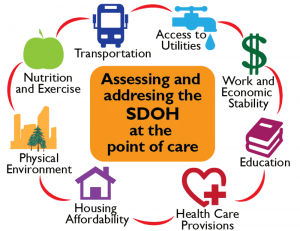Career & Leadership Development in Nursing
Connect with WCN
- Home
- Career & Leadership Development in Nursing
- Social Determinants of Health
Social Determinants of Health
SDOH or SDH
 WCN aims to reduce health disparities and improve health outcomes for Washingtonians. One strategy is to take advantage of the fact that nurses are the largest segment of the health care workforce interacting with patients in a wide variety of settings and with a strong foundation of trust. This makes them well-positioned to take the lead in improving health by getting at the cause of 80% of health outcomes – the “social determinants of health” (SDOH, also referred to as SDH).
WCN aims to reduce health disparities and improve health outcomes for Washingtonians. One strategy is to take advantage of the fact that nurses are the largest segment of the health care workforce interacting with patients in a wide variety of settings and with a strong foundation of trust. This makes them well-positioned to take the lead in improving health by getting at the cause of 80% of health outcomes – the “social determinants of health” (SDOH, also referred to as SDH).
SDOH are the conditions in which people are born, grow, live, work, and age. These conditions result from differences in the distribution of money, power and resources, which subsequently result in health disparities. While at first glance this may not sound like something nurses can influence, data says otherwise: Nurses and other allied health professionals can screen for and address SDOH in partnership with community-based organizations and affect health outcomes for the better.
There are many examples of SDOH, the most impactful of which are income and education. Other common factors include housing stability, food security, access to reliable transportation, social support and sense of belonging, safety, language and literacy, and so forth.
In its attempt to improve health equity, WCN is proactively working with nurses and others to understand the best ways to ensure patients’ SDOH needs are met so that clinical and non-clinical measures of health and well-being improve and Washingtonians thrive.
 To help nurses take the lead in addressing SDOH where they work, WCN has created a toolkit that facilities can use to collect information on the extent to which nurses and their colleagues are addressing SDOH for their patients. This includes identifying the opportunities and challenges to integrate SDOH into practice. By encouraging the entire care team to address SDOH in partnership with community-based organizations, nurses can make a significant contribution as transformative leaders in improving population health.
To help nurses take the lead in addressing SDOH where they work, WCN has created a toolkit that facilities can use to collect information on the extent to which nurses and their colleagues are addressing SDOH for their patients. This includes identifying the opportunities and challenges to integrate SDOH into practice. By encouraging the entire care team to address SDOH in partnership with community-based organizations, nurses can make a significant contribution as transformative leaders in improving population health.
This toolkit was used by WCN to survey nurses across Washington State on how they address SDOH at the point of care and has been adapted for generic use.
Please contact us with any questions you might have.

